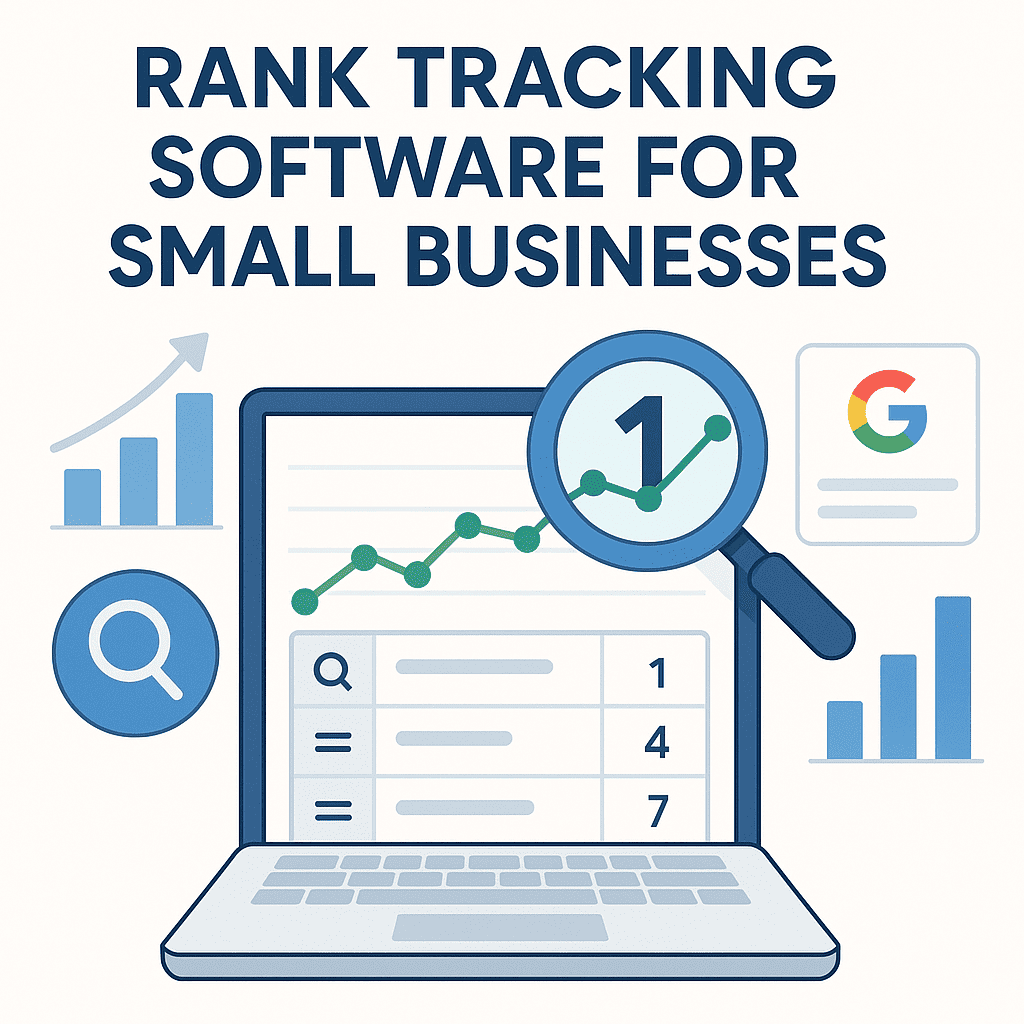10 Best Rank Tracking Software for Small Businesses in 2025


Choosing the best rank tracking software for small businesses starts with understanding what rank tracking actually is. Many small business owners are familiar with SEO, but may not know how to measure the effectiveness of their efforts in search engines. Rank tracking tools are designed to solve that problem.
Table of Contents
These tools monitor how a website ranks in search results for specific keywords over time. This helps businesses understand which keywords are improving, which are declining, and how visible their pages are on platforms like Google.
In this article, you’ll learn what rank tracking software is, why it matters to small businesses, and how to choose the right tool for your needs. We’ll also explore the top 10 rank tracking software options specifically suited for small business budgets and requirements.
What Is Rank Tracking Software For Small Businesses
Rank tracking software monitors where your website appears in search engine results for specific keywords. When someone searches for “plumber in Chicago” or “best coffee shop near me,” these tools show you exactly where your business ranks in those results.
The basic function of rank tracking software is to record your position for each keyword over time. For example, if your coffee shop ranked 15th for “best coffee shop” last month but ranks 8th today, the software shows this improvement.
For small businesses, rank tracking software offers several key benefits:
- Measurement: It shows whether your SEO efforts are actually working
- Competitive insight: You can see how you rank compared to local competitors
- Focus: It helps identify which keywords bring the most traffic
- ROI tracking: You can connect ranking improvements to business results
Most rank tracking tools update daily or weekly and display results in simple charts or reports. They often include features like email alerts when rankings change significantly or the ability to track rankings in specific locations.
Unlike manual checking (which gives personalized results based on your search history), rank tracking software provides objective data about where your business actually appears for most searchers.
Why Small Businesses Need SEO Rank Tracking Software
Small businesses compete with larger companies that often have bigger marketing budgets. Rank tracking software helps level the playing field by providing clear data about search visibility.
With rank tracking software, small businesses can:
- Monitor performance for local keywords that matter most to nearby customers
- Track improvements after making website changes
- Identify which pages perform well and which need improvement
- Spot new keyword opportunities based on current rankings
For example, a local bakery might discover they rank well for “custom birthday cakes” but poorly for “wedding cakes,” helping them decide where to focus their content efforts.
The best keyword rank tracking software also helps small businesses avoid wasting time on strategies that don’t work. If rankings don’t improve after several content updates, it might be time to try a different approach.
Most importantly, rank tracking provides objective measurement. Rather than guessing whether SEO efforts are working, small business owners can see concrete results and make data-driven decisions about their marketing investments.
Key Factors To Consider When Choosing Ranking Software
When selecting rank tracking software for your small business, focus on these essential factors:
Price structure: Small businesses typically need affordable, scalable pricing. Look for:
- Monthly plans that grow with your needs
- Clear pricing with no hidden fees
- Free trials to test before committing
Accuracy: The software should provide reliable data about your actual rankings. Consider:
- How often rankings update (daily is ideal)
- Whether the tool accounts for personalization factors
- If it tracks both desktop and mobile rankings
Local tracking: For businesses serving specific areas, the ability to track rankings by city, ZIP code, or region is crucial. The software should:
- Allow tracking for multiple locations
- Show map pack/local pack rankings
- Support “near me” search tracking
Reporting features: Look for tools that make data easy to understand:
- Visual dashboards showing ranking trends
- Exportable reports for sharing with team members
- Scheduled email updates about ranking changes
Integration options: The best rank tracking tools connect with other marketing platforms:
- Google Analytics integration
- Google Search Console connection
- Export capabilities for custom reporting
Different industries have unique needs. A restaurant might focus heavily on local rankings and review tracking, while an online store might prioritize product keyword rankings across a wider region.
10 Best Rank Tracker Software Options For Small Businesses
1. SE Ranking
SE Ranking offers affordable rank tracking with strong local SEO features. Small businesses appreciate its user-friendly interface and comprehensive reporting options.
Price: Starts at $44/month with a free trial
Key features:
- Multi-location rank tracking
- White-label reports for agencies
- Local SEO toolkit included
- Keyword suggestion tool
Limitations: Entry-level plans have keyword volume restrictions
2. Whitespark
Whitespark specializes in local rank tracking, making it perfect for businesses serving specific geographic areas.
Price: From $39/month with free trial
Key features:
- ZIP code level tracking
- Citation building tools
- Review monitoring
- Local rank tracking dashboard
Limitations: Focuses primarily on local SEO rather than broader tracking
3. Rank Tracker by SEO PowerSuite
This desktop-based tool offers unlimited keyword tracking even on its free plan, making it budget-friendly for small businesses.
Price: Free version available; paid plans from $149/year
Key features:
- Unlimited keywords
- Competitor rank tracking
- Customizable reports
- One-time payment option (not subscription)
Limitations: Requires software installation rather than cloud access
4. Nozzle
Nozzle provides detailed SERP analysis and rank monitoring with flexible data visualization options.
Price: From $49/month with free trial
Key features:
- On-demand ranking updates
- Customizable dashboard widgets
- Competitor tracking
- SERP feature monitoring
Limitations: Pricing based on data pulls rather than keyword volume
5. AccuRanker
Known for accuracy and speed, AccuRanker delivers reliable daily rank tracking data.
Price: Starts at $116/month with free trial
Key features:
- Daily rank tracking updates
- Unlimited users
- Google Grump rating (algorithm volatility)
- Share of voice metrics
Limitations: Higher starting price than some alternatives
6. Advanced Web Ranking
Advanced Web Ranking offers robust reporting capabilities and white-label options.
Price: From $49/month with free trial
Key features:
- Search engine rank tracking across multiple engines
- Customizable client reports
- Scheduled automated reports
- Data center selection
Limitations: Interface has steeper learning curve
7. Moz Pro
Moz Pro combines rank tracking with broader SEO tools in an integrated platform.
Price: Starts at $99/month with free trial
Key features:
- Keyword difficulty scores
- Page optimization suggestions
- Integration with other Moz tools
- Web ranking tools suite
Limitations: Limited keywords on lower-tier plans
8. Semrush
Semrush offers comprehensive SEO capabilities including detailed rank tracking.
Price: From $129.95/month with free trial
Key features:
- Best keyword rank tracker software for competitive analysis
- Position tracking across devices
- Rank tracking tools with visualization
- International tracking options
Limitations: Higher price point for small businesses
9. Ahrefs
Ahrefs provides rank tracking alongside powerful backlink and content analysis tools.
Price: Starts at $99/month (no free trial)
Key features:
- Historical ranking data
- Best SEO rank tracker for content gap analysis
- Keyword research integration
- Competitor tracking
Limitations: No free trial option
10. Nightwatch
Nightwatch offers affordable rank tracking with strong local and international capabilities.
Price: From $39/month with free trial
Key features:
- Ranking check software with local focus
- Customizable reports
- Multi-language tracking
- Google Analytics integration
Limitations: Fewer third-party integrations than some competitors
How To Compare Free And Enterprise Rank Tracking Software
Small businesses often face a choice between free rank tracking software and more expensive enterprise solutions. Understanding the differences helps you find the right balance for your needs:
| Feature | Free Rank Tracking Software | Enterprise Rank Tracking Software | Small Business Sweet Spot |
|---|---|---|---|
| Keyword volume | 10-50 keywords | 1,000+ keywords | 100-500 keywords |
| Update frequency | Weekly or manual | Daily or hourly | Daily |
| Location tracking | Limited or none | Multiple locations, precise targeting | City-level tracking |
| Reporting | Basic metrics only | Custom, white-label, automated | Simple but exportable |
| Integrations | Few or none | APIs, CRM, analytics platforms | Google Analytics, Search Console |
Free rank tracking software works well for businesses just starting with SEO or tracking a handful of keywords. These tools typically offer basic position monitoring but lack advanced features.
Enterprise rank tracking software provides comprehensive data and customization but comes with higher costs. These platforms serve large companies tracking thousands of keywords across multiple websites.
Most small businesses find their sweet spot in the middle—affordable tools with enough features to track local rankings effectively without unnecessary complexity. The ideal solution typically offers:
- Daily ranking updates
- Location-specific tracking
- Basic competitor monitoring
- Simple, shareable reports
- Reasonable monthly cost
When deciding between free and paid options, consider how many keywords you need to track, how important local rankings are to your business, and whether you need to share reports with team members or clients.
Steps To Use Rank Tracking Tools Effectively
Once you’ve chosen rank tracking software, follow these steps to get the most value from it:
1. Select The Right Keywords To Track
Start by identifying keywords that actually matter to your business:
- Terms customers use when searching for your products or services
- Location-specific phrases if you serve local customers
- Long-tail keywords that show clear purchase intent
- Branded terms (your business name and variations)
Focus on quality over quantity. Tracking 50 relevant keywords provides more value than tracking 500 random terms.
2. Set Up Proper Tracking Settings
Configure your rank tracking software correctly:
- Select the right search engines (Google, Bing, etc.)
- Specify your target locations (cities, regions)
- Choose both mobile and desktop tracking
- Set up competitor tracking for key rivals
Most tools allow you to organize keywords into groups or projects, making it easier to track different product lines or locations separately.
3. Establish A Regular Review Schedule
Checking rankings obsessively can waste time and create unnecessary stress. Instead:
- Review comprehensive reports weekly or bi-weekly
- Set up alerts for significant ranking changes
- Look for trends rather than daily fluctuations
- Connect ranking data with website traffic statistics
This approach helps you spot meaningful patterns without getting distracted by normal ranking volatility.
4. Use Data To Improve Your SEO Strategy
Rank tracking data should inform your SEO efforts:
- Identify pages that rank on page two (positions 11-20) for quick improvement opportunities
- Notice keyword clusters where you perform well or poorly
- Track ranking changes after website updates
- Monitor competitor movements in search results
The goal isn’t just to collect data but to use it to make better decisions about your website content and SEO strategy.
Moving Forward With Your Rank Tracking Software
Choosing the right rank tracking software helps small businesses monitor search visibility efficiently. The best tools balance affordability with useful features that provide actionable insights.
Remember that rank tracking is just one part of a complete SEO strategy. Use the data from your tracking software to inform content creation, website improvements, and local SEO efforts.
As your business grows, your rank tracking needs may change. Many tools offer scalable plans that grow with you, allowing you to track more keywords or add more locations as needed.
For help comparing and selecting the best SEO tools for your specific business needs, visit TopSEOTools.io. Our platform provides up-to-date reviews and comparisons of the latest rank tracking software and other SEO tools.
Frequently Asked Questions About Rank Tracking Software
What makes rank tracking software different from Google Search Console?
Rank tracking software provides unbiased ranking data across multiple search engines and locations, while Google Search Console only shows average positions for queries that already bring traffic to your site.
How much should a small business expect to pay for quality rank tracking software?
Most small businesses can find effective rank tracking software in the $30-$100 per month range, depending on how many keywords they need to track and what additional features they require.
How often should small businesses check their keyword rankings?
Weekly or bi-weekly rank checks provide the most useful data for small businesses, as daily fluctuations often don’t represent meaningful trends.
Can rank tracking software help with local SEO for service-area businesses?
Yes, many rank tracking tools offer location-specific tracking that shows how your business ranks in different cities or ZIP codes within your service area.
Should small businesses track rankings for their competitors’ websites?
Tracking competitor rankings provides valuable context for your own performance and helps identify new keyword opportunities your competitors might be targeting successfully.



